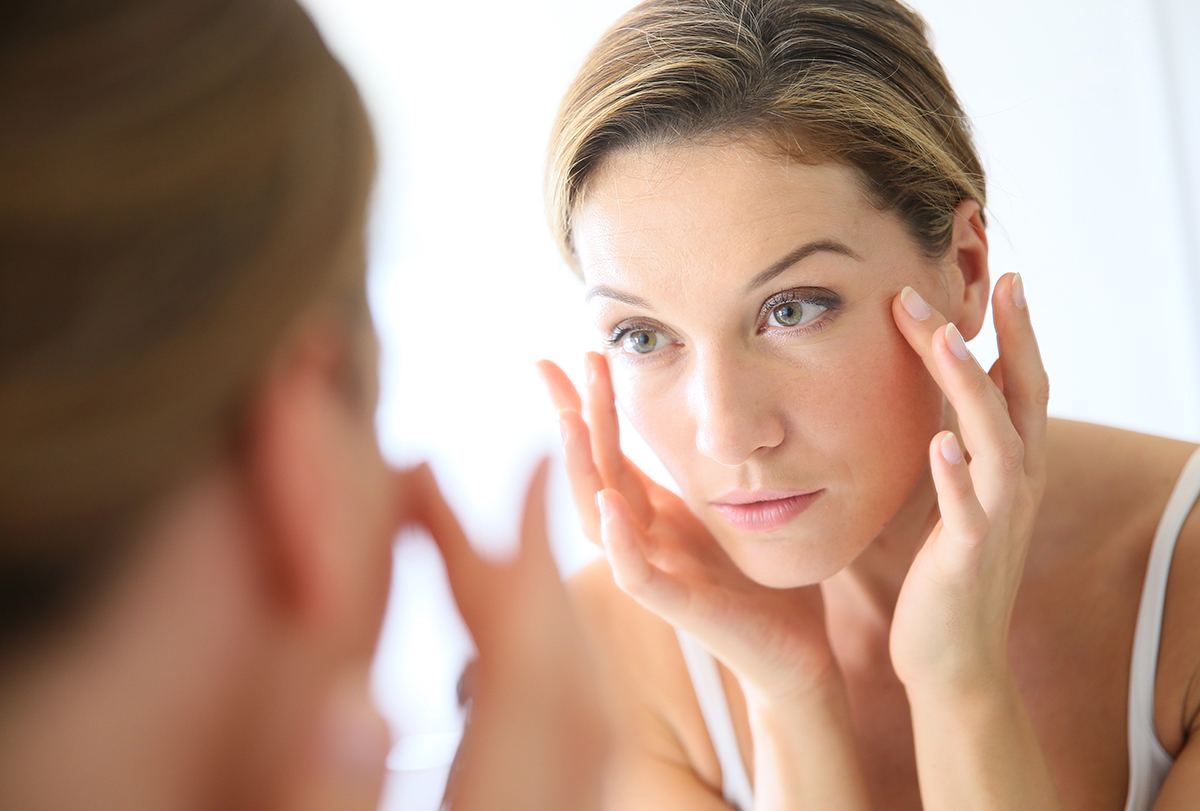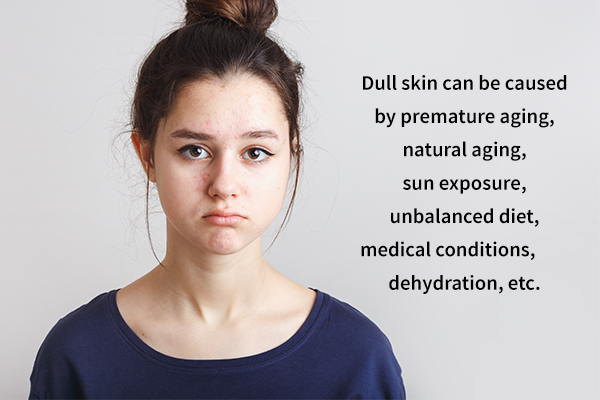In this article:
Healthy, glowing skin is often considered a symbol of good health and vitality. However, with the skin being exposed to various factors that can have a negative impact on its health, it is extremely common for the skin to appear dull.

Skin dullness, along with discoloration and sagginess, can also result from aging. Regardless of the cause, dull skin is a highly undesirable feature among people.
This article discusses the various causes, different medical treatments, and risk factors associated with dull skin.
Causes of Dull Skin

The following factors can be responsible for dull-looking skin:
- Premature aging. This is caused by an increase in oxidative stress in the body, due to the accumulation of free radicals.
- Natural aging. Dull, pale-looking skin is a part of the natural aging process.
- Sun exposure. Excessive exposure to the sun, especially in the absence of sun protectants, can cause photoaging (1) by increasing oxidative stress in the body. The harmful UV rays may also cause DNA damage. This is more common among white-skinned people and Caucasians as compared to darker-skinned individuals. (2)
- Unbalanced diet. A nonnutritious diet can impair effective body functioning, which can easily reflect on the skin.
- Medical conditions. These include gastrointestinal problems such as constipation and contact dermatitis, among others.
- Medications. Certain drugs or medicinal therapies such as radiotherapy or chemotherapy can also cause skin dullness.
- Dehydration. The health and functioning of your skin also depend on its hydration levels. Therefore, a lack of water can result in dull skin. (3)
- Lack of sleep. It is essential to get around 7 hours of sound sleep to allow your body to detoxify. Without proper sleep, toxins may affect skin health.
- Tobacco use. Smoking or tobacco consumption can have a negative impact on collagen levels, resulting in reduced skin elasticity. This makes the skin saggy and loose. Moreover, tobacco contributes to oxidative stress in the body and thus induces premature aging. (4)
- Alcohol consumption. An unregulated intake of alcohol can also contribute to skin dullness.
- Improper moisturization. Not using moisturizers such as lotions, serums, or creams, especially in dry weather, can contribute to skin dullness.
- Not exfoliating the skin. It is essential to exfoliate the skin at least once weekly to help prevent the buildup of dead skin cells on the surface. However, make sure to not overexfoliate the skin.
- Use of harsh chemicals. Skin products that are laden with chemicals such as sulfates and parabens can irritate the skin and are a common cause of dermatitis.
- Improper skin care. This includes the use of hot water frequently for bathing, not removing makeup before sleeping, and rubbing the skin with a harsh towel after washing instead of patting it dry.
- Weather conditions. The skin may often appear dry and dull in dry, hot weather or excessively cold conditions with low humidity.
- Environmental pollution (5)
- Psychological stress
Symptoms of Dull Skin
Dull skin may be accompanied by the following signs and symptoms:
Medical Treatment for Skin Rejuvenation

Dull skin is generally a result of poor lifestyle habits (1) and therefore can be managed with the help of self-care. You may require medical treatment if you have an underlying medical problem.
Depending on the cause, your doctor may suggest the following treatments to help rejuvenate your skin: (6)
1. Creams
You may be prescribed creams containing deoxyarbutin, retinoid, glycolic acid, alpha-hydroxy acids, and kojic acid for the treatment of age spots. Make sure to use sunscreen with these creams as they can increase sensitivity to sunlight. (7)
You may also be suggested to use antioxidant creams such as those containing vitamin C to help control inflammation and collagen damage.
2. Cell regulators
These medications contain growth factors and peptides that can help boost collagen production. (5)
3. Bleaches
You may benefit from prescription-strength bleaches that contain hydroquinone.
4. Laser therapy
Different lasers, such as Q-switched Nd:YAG and ruby laser, are used to help remove pigmentation without scarring the skin.
5. Photodynamic therapy
PDT is a common treatment used to help reverse sun damage and remove age spots.
6. Intense pulsed light therapy
IPL can help even out your skin tone and manage collagen deposition. (8)
7. Hormone replacement therapy
This is useful if the skin dullness is caused by hormonal imbalance. (5)
8. Dermabrasion and microdermabrasion
This involves the use of small brushes to help remove dead skin cells from the skin surface. Often, this treatment requires multiple sessions and may have side effects, such as swelling and redness that fades with time.
9. Chemical peels
This treatment uses glycolic acid to remove the upper layer of skin, thus helping reveal new, rejuvenated skin layers.
10. Injectables and fillers
Injections such as Botox injections or hyaluronic acid-based derma fillers can help improve the appearance of wrinkles and folds temporarily.
11. Medications
You may require medicines such as antacids, proton pump inhibitors, and histamine blockers if the cause of the skin dullness involves gastrointestinal disorders.
Diagnosing the Cause of Dull Skin

In most cases, skin dullness and its cause can be identified after a close physical examination. This includes noting the appearance of age spots, wrinkles, and other signs of aging.
The doctor will also ask about your medical history. If your doctor suspects a gastrointestinal problem, the following tests may be needed:
- Blood test
- Urine test
- Colonoscopy
In some cases, the doctor may ask for a skin biopsy, which helps distinguish an age spot from conditions such as lentigo maligna.
Complications Associated With Increasing Skin Dullness
Persistent skin dullness may be associated with the following complications:
- Skin blistering
- Fungal infections or cellulitis
- Fever
- Dehydration
- Skin cancer
- Premature aging
- Low self-confidence
- Social withdrawal
When to See a Doctor
Dull skin, often resulting from environmental pollution, improper diet, or lack of moisture in the skin, can be generally managed with self-care.
However, if left untreated, dull skin can lead to complications, including itchiness, flakiness, and premature aging. Therefore, it is must to consult a doctor if you notice skin dryness along with:
- Symptoms of premature skin aging
- Fatigue
- Nausea or abdominal discomfort
- Vomiting
- Dehydration
Final Word
Being exposed to the outside environment, your skin can quickly lose its health if not taken care of properly. Your skin may appear dull and aged due to pollution, medications, or fatigue. Therefore, it is essential to take proper care of your skin.
If your skin condition does not improve despite proper self-care, you must consult a doctor as skin dullness may be symptomatic of an underlying problem. Several medical treatments can help rejuvenate the skin, making it healthy and look fresh and young.

- Was this article helpful?
- YES, THANKS!NOT REALLY


